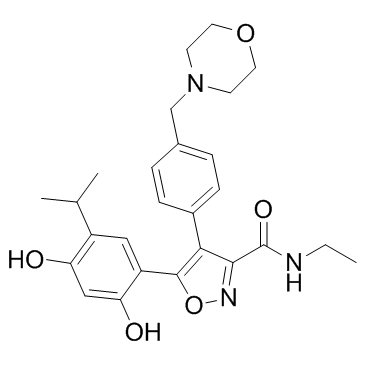
NVP-AUY922
CAS No. 747412-49-3
NVP-AUY922( Luminespib | AUY922 | VER-52296 | VER-52296 | VER52296 )
Catalog No. M15850 CAS No. 747412-49-3
A potent and selective HSP90 inhibitor with IC50 of 21 and 7.8 nM for HSP90β and HSP90α, respectively.
Purity : >98% (HPLC)
 COA
COA
 Datasheet
Datasheet
 HNMR
HNMR
 HPLC
HPLC
 MSDS
MSDS
 Handing Instructions
Handing Instructions
| Size | Price / USD | Stock | Quantity |
| 5MG | 47 | In Stock |


|
| 10MG | 67 | In Stock |


|
| 25MG | 133 | In Stock |


|
| 50MG | 210 | In Stock |


|
| 100MG | 344 | In Stock |


|
| 200MG | 512 | In Stock |


|
| 500MG | 825 | In Stock |


|
| 1G | Get Quote | In Stock |


|
Biological Information
-
Product NameNVP-AUY922
-
NoteResearch use only, not for human use.
-
Brief DescriptionA potent and selective HSP90 inhibitor with IC50 of 21 and 7.8 nM for HSP90β and HSP90α, respectively.
-
DescriptionA potent and selective HSP90 inhibitor with IC50 of 21 and 7.8 nM for HSP90β and HSP90α, respectively; weakly inhibits HSP90 family members GRP94 and TRAP-1 (Ki=108 and 53 nM), shows no inhibition of HSP72 ATPase and little or no activity against a range of 13 kinases; inhibits proliferation of human tumor cells (GI50=2-40 nM), induces G(1)-G(2) arrest and apoptosis; exhibits in vivo activity against xenograft tumor growth, angiogenesis and metastasis.Pancreatic Cancer Discontinued(In Vitro):Luminespib is a potent and selective HSP90 inhibitor, with IC50s and Kis of 21 ± 16, 8.2 ± 0.7 nM against HSP90β and of 7.8 ± 1.8, 9.0 ± 5.0 nM for HSP90α. Luminespib shows weak activity against GRP94 and TRAP-1 wich IC50s of 535 ± 51 nM (Ki, 108 nM) and 85 ± 8 nM (Ki, 53 nM), respectively. Luminespib exhibits inhibitory effect on proliferation of various human tumor cell lines (2.3-49.6 nM), induces cell cycle arrest and apoptosis and depletes client proteins in human cancer cells (80 nM). Luminespib (100 nM) significantly reduces CD40L fibroblast-induced changes in immunophenotype and STAT3 signaling but with no effect on the viability of chronic lymphocytic leukemia (CLL) cells. Luminespib (500 nM) in combination with NSC 118218 more effectively induces apoptosis in cells in co-culture than either drug alone, and overcomes fibroblast-derived resistance to Hsp90 inhibitor. Luminespib shows great inhibition of pancreatic cancer cells with IC50 of at 10 nM. Luminespib (10 nM) reduces the expression and the epidermal growth factor (EGF)-mediated activation of EGFR and substantially disrupts EGF signaling in terms of diminishing downstream phosphorylation of ERKThr202/Tyr204. Luminespib (10 nM) significantly blocks pancreatic cancer cell migration and invasion both in the absence and presence of EGF.(In Vivo):Luminespib (50, 75 mg/kg, i.p.) significantly inhibits tumor growth rate, reducing the mean weights of tumors on day 11 in human tumor xenografts. Luminespib (50 mg/kg/week, 3×25 mg/kg/week) significantly reduces tumor growth rates and lowers tumor weights in the L3.6pl pancreatic cancer cell-bearing mice model.
-
In VitroLuminespib is a potent and selective HSP90 inhibitor, with IC50s and Kis of 21 ± 16, 8.2 ± 0.7 nM against HSP90β and of 7.8 ± 1.8, 9.0 ± 5.0 nM for HSP90α. Luminespib shows weak activity against GRP94 and TRAP-1 wich IC50s of 535 ± 51 nM (Ki, 108 nM) and 85 ± 8 nM (Ki, 53 nM), respectively. Luminespib exhibits inhibitory effect on proliferation of various human tumor cell lines (2.3-49.6 nM), induces cell cycle arrest and apoptosis and depletes client proteins in human cancer cells (80 nM). Luminespib (100 nM) significantly reduces CD40L fibroblast-induced changes in immunophenotype and STAT3 signaling but with no effect on the viability of chronic lymphocytic leukemia (CLL) cells. Luminespib (500 nM) in combination with NSC 118218 more effectively induces apoptosis in cells in co-culture than either drug alone, and overcomes fibroblast-derived resistance to Hsp90 inhibitor. Luminespib shows great inhibition of pancreatic cancer cells with IC50 of at 10 nM. Luminespib (10 nM) reduces the expression and the epidermal growth factor (EGF)-mediated activation of EGFR and substantially disrupts EGF signaling in terms of diminishing downstream phosphorylation of ERKThr202/Tyr204. Luminespib (10 nM) significantly blocks pancreatic cancer cell migration and invasion both in the absence and presence of EGF.
-
In VivoLuminespib (50, 75 mg/kg, i.p.) significantly inhibits tumor growth rate, reducing the mean weights of tumors on day 11 in human tumor xenografts. Luminespib (50 mg/kg/week, 3×25 mg/kg/week) significantly reduces tumor growth rates and lowers tumor weights in the L3.6pl pancreatic cancer cell-bearing mice model.
-
SynonymsLuminespib | AUY922 | VER-52296 | VER-52296 | VER52296
-
PathwayCytoskeleton/Cell Adhesion Molecules
-
TargetHSP
-
RecptorHSP90α|HSP90β
-
Research AreaCancer
-
IndicationPancreatic Cancer
Chemical Information
-
CAS Number747412-49-3
-
Formula Weight465.5414
-
Molecular FormulaC26H31N3O5
-
Purity>98% (HPLC)
-
SolubilityDMSO: ≥ 62 mg/mL
-
SMILESO=C(C1=NOC(C2=CC(C(C)C)=C(O)C=C2O)=C1C3=CC=C(CN4CCOCC4)C=C3)NCC
-
Chemical Name3-Isoxazolecarboxamide, 5-[2,4-dihydroxy-5-(1-methylethyl)phenyl]-N-ethyl-4-[4-(4-morpholinylmethyl)phenyl]-
Shipping & Storage Information
-
Storage(-20℃)
-
ShippingWith Ice Pack
-
Stability≥ 2 years
Reference
1. Brough PA, et al. J Med Chem. 2008 Jan 24;51(2):196-218.
2. Eccles SA, et al. Cancer Res. 2008 Apr 15;68(8):2850-60.
3. Jensen MR, et al. Breast Cancer Res. 2008;10(2):R33.
4. Stühmer T, et al. Leukemia. 2008 Aug;22(8):1604-12.
molnova catalog



related products
-
IPI-493
IPI-493 (17-amino17demethoxy) is a novel HSP90 inhibitor with antitumor activity.
-
PF-04929113 Mesylate
The prodrug of PF-04928473 (SNX-2112), a potent, orally bioavailable HSP90 inhibitor.
-
AMP-PCP
AMP-PCP is an ATP analogue and can bind to Hsp90 N-terminal domain with a Kd value of 3.8 μM. AMP-PCP binding favors the formation of the active homodimer of Hsp90.



 Cart
Cart
 sales@molnova.com
sales@molnova.com


